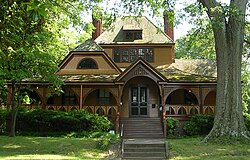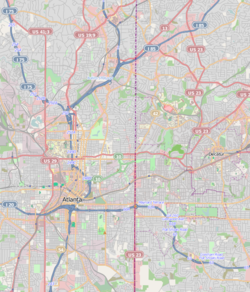Whitehall (Atlanta)
|
West End Historic District
|
|

The Wren's Nest, author Joel Chandler Harris's home in West End
|
|
| Location | Atlanta, Georgia |
|---|---|
| Coordinates | 33°44′16″N 84°25′23″W / 33.73778°N 84.42306°WCoordinates: 33°44′16″N 84°25′23″W / 33.73778°N 84.42306°W |
| Architect | Humprhies, George P.; Adair, G.W., et al. |
| Architectural style | Late 19th And Early 20th Century American Movements, Late 19th And 20th Century Revivals, Late Victorian |
| NRHP reference # | 97000621 |
| Added to NRHP | February 25, 1999 |
The West End neighborhood of Atlanta is on the National Register of Historic Places and can be found southwest of Castleberry Hill, east of Westview, west of Adair Park Historic District, and just north of Oakland City. It would be difficult to find a neighborhood more closely linked to the city's, state's, region's, and nation's historical development than the West End district of Atlanta. Architectural styles within the district include Craftsman Bungalow, Queen Anne, Stick style, Folk Victorian, Colonial Revival, American Foursquare and Neoclassical Revival.
In this century, West End has endured many changes in its metamorphosis to an intown neighborhood while retaining its own distinctive character and vitality. This has been accomplished both by adaptation and participation in change and by its citizens' recognition of the district's special history.
Before there was a West End or an Atlanta, the area was a crossroads. Newnan Road connected the town of that name to Decatur and Lawrenceville. Crossing this road was the Sandtown Road going west to an Indian town of that name. Near this junction around 1830, Charner Humphries established an inn/tavern which came to be known as Whitehall due to the then unusual fact that it had a coat of white paint when most other buildings were of washed or natural wood.
From a frontier outpost in the 1830s, the district evolved into an independent political entity closely linked by rail and roads to its neighbor Atlanta.
in April 1871, Richard Peters and George Adair bought out the charter of the Atlanta Street Railway Company (horse-drawn) and on September 1 of that year opened the first section connecting Five Points to the West End – a route that passed by both of their homes. The following year the West End & Atlanta Street Railroad also started service to West End and Westview Cemetery.
...
Wikipedia

